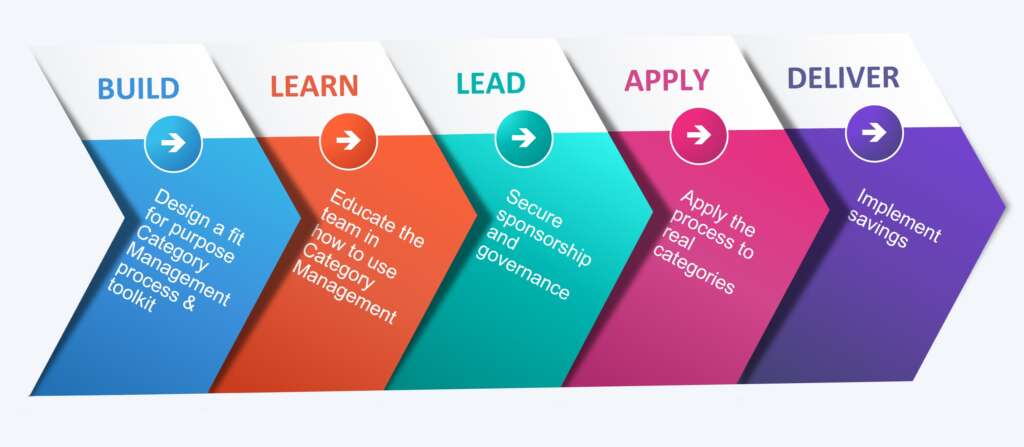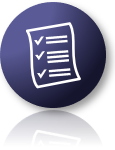
Insight
Maximise SRM & Category Management performance
By Simon Brown |
Maximise the return from SRM and Category Management training investment by ensuring that its value is demonstrably improved.
The drive to maximise investment
A key part of any supplier or category management implementation is the education of the procurement team in the new ways of working – this is covered in the “Learn” building block of our category management implementation approach (figure 1). We have recently worked with a number of organisations that need to maximise their return from training investment by ensuring that it demonstrably improves team member performance. So how do we ensure we are converting supplier management and category management training into performance? Here we summarise some of the evolving education best practices that we have implemented with leading organisations.

Educating stakeholders
Stakeholders do not require (and are usually not interested in receiving) the depth of education that is required by the procurement team. However, it is critical that they receive the correct level of training/communication. Without this input, stakeholders are left unclear regarding objectives, processes and resource commitments with category managers spending a lot of time trying to gain traction. Our recommendations for stakeholders are:
(i) Leadership Teams:
30-60 minute awareness sessions focused on the outcomes from the new ways of working and what input and support is required. Ideally, stakeholders and procurement are jointly responsible for agreeing savings targets and delivering them – this accelerates all engagement and delivery.
(ii) General:
1-2 hour awareness sessions focused on why the processes are being adopted, how they are different from traditional sourcing activity, what they consist of at a high level, what benefits they will deliver to them and what they will need to contribute (willingness to engage and drive change, resources etc).
(iii) Category/Relationship Sponsors and Team Members:
1-2 hour sessions focused on why the process is being adopted and what it will consist of at a high level, typical level of benefits expected, what their role and responsibilities, governance processes, timings and potential interventions they may need to make.
Blending Technical and Behavioural Skills in supplier management & category management training
FP has increasingly included more behavioural skills training in our standard sourcing skills workshops. This is in recognition that the overall delivery performance is impaired without buy-in from stakeholders and that many category managers need to improve their behavioural capabilities. Having a balance of behavioural and hard skills training is definitely a better route to follow.
Example topics that we have delivered recently include: Becoming A Trusted Advisor; Communication Skills; Consultative Selling; Creativity; and Conflict Management. This is not generic training, but aligned with the key activities in category and supplier management processes and addresses the challenges and barriers that category managers and supplier managers regularly face.
Extensive Workshop Planning
During the workshop planning phase, it is important to ensure your learning objectives, programme structure, content and style is aligned with internal learning and development professionals. It is also helpful to design an education programme that uses a blended suite of training methods and interventions.
The impact of education workshops is greatly enhanced if the full range of pre, during and post activities are considered. A checklist of potential activities includes:

Pre-workshop Activities
- Involve the participants in design via design team representatives.
- Link the education to a bigger process (personal development plans and/or real category projects).
- Engage the learner’s manager in providing coaching support before and after the event.
- Use defined role competencies to assess improved performance.
- Market the programme with innovative branding.
- Communicate the multiple tiers of learning available.
- Send-out welcome packs and pre-event activities.
- Link rewards to the transfer of learning back to work.

During-workshop activities
- Build readiness to learn (clarify personal objectives and benefits).
- Utilise the experience of the participants by actively involve the participants in their learning.
- Use a variety of brain friendly active learning methods to keep interest alive and energy high.
- Keep the ball in their court (70% doing/30% input).
- Use relevant case studies and exercises to practice skills.
- Combine technical skills training with behavioural skills often involving role play with actors.
- Encourage “back on the job” application and agreed action plans.

Post-workshop activities
- Reinforce learning by using a wide range of self managed learning opportunities on real life projects so they can practically apply their learning.
- Coaching support from the line manager to supervise the outputs from these post-training activities.
- Reminder cards, posters, booklets or e-mails of key learning.
- Use of the Intranet or newsletter to capture success stories and fresh application of ideas.
Measuring Return on Investment for Supplier management & category management training
Return can be assessed through three approaches:
I. Individual Competence:
Participants and their line managers use a simple competence assessment framework to agree scores prior to the training interventions. These assessments are repeated when the participants have completed their first category planning or strategic sourcing activity and the results compared. Along with the quantitative results from the category management or SRM activity, this will measure the improved capability of the participants.
II. Value Delivery:
Value Delivery: Track the uplift in savings/value delivered from projects that use category management versus traditional sourcing.
III. Business Partner Satisfaction:
Track the uplift in internal customer satisfaction levels that is expected with the introduction of category and supplier management.
Learning & Development
We believe that learning and development should be focused on and drive high team performance.
Strengthening procurement’s technical skills, as well as the full range of business and leadership behaviours, is central to everything that Future Purchasing does with its clients.
We offer a wide range of innovative and inspirational learning and development programmes designed to build confidence, competence and real motivation to deliver results.
If you would like to know more about moving supplier management and category management training to performance, click the “Let’s Talk” button below.
Find out more about our Interactive Virtual Learning

About Simon Brown
Director
30 years procurement experience in line management and
consulting roles.
Previous employment: British Aerospace, British Airways, QP Group
Education: MBA, London Business School. BA (Hons) Business Studies.
CIPS: member
Further Reading

Blog
SRM and category management skills – How do you convert training into performance?
09/12/2019
Read More

Case study
At AstraZeneca the foundations of category management are built on stakeholder engagement
07/11/2023
Read More

Case study
Mark Smith interview – A lean category management model is at the heart of procurement at bp
08/02/2024
Read More